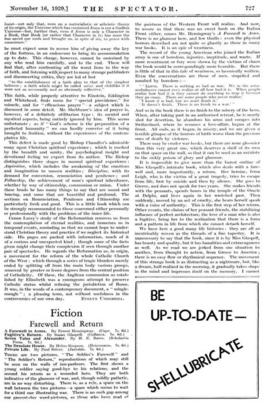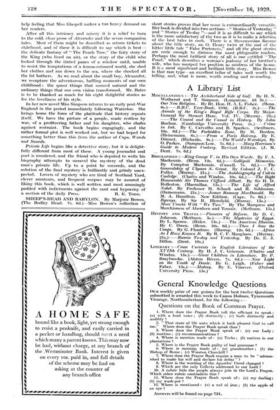Fiction
Farewell and Return
A Farewell to Arms. By Ernest Hemingway. (Cape. 7s. 6d.) THERE are two pictures, " The Soldier's Farewell " and " The Soldier's Return," reproductions of which may still be seen on the walls of inn-parlours. The first shows a young soldier saying good-bye to his relations, and the second his return as a wounded hero. They are both indicative of the glamour of war, and, though mildly pathetic, 'are in no way disturbing. There is, as a rule, a space on the wall between the two pictures—a space which seems to wait for a third one illustrating war. There is no such gap among our present-day word-pie lures, as those who have read of
the quietness of the Western Front will realize. And now; to assure us that there was no sweet hush on the Italian Front either, comes Mr. Hemingway's A Farewell to Arms. There is no glamour here, and few thrills : even the physical horrors described are not quite so ghastly as those in many war books. It is an epic of weariness.
The record of the young American who joined the Italian army is one of boredom, injustice, ineptitude, and waste. If more resentment or fury were shown by the victims of chaos the book would be correspondingly more bearable. But there is little of that in this tale of weariness, so laconically written. Even the conversations are those of men, stupefied and numbed by boredom :-
"'Listen. There is nothing so bad as war. We in the auto- ambulances cannot even realize at all how bad it is. When people realize how bad it is they cannot do anything to stop it because they go crazy. There are some people who never realize.'
' I know it is bad, but we must finish it.'
. It doesn't finish. There is no finish to a war.' "
And so in the book there is no finish to the misery of the hero. When, after taking part in an authorized retreat, he is nearly shot for desertion, he abandons his arms and escapes into Switzerland, where he resumes a love-affair, begun at the front. All ends, as it began, in misery, and we are given a terrible glimpse of the horrors of birth worse than the previous ones of death by violence.
There may be cruder war books, but there arc none gloomier than this very great one, which deserves a shelf of its own on that space on the wall, so that it can be used as an antidote to the sickly poison of glory and glamour.
It is impossible to give more than the barest outline of Miss Glaspell's intricate book, which also deals with a fare- well and, more importantly, a return. Her heroine, Irma Leigh, who is the victim of a great tragedy, tries to escape from life, first by suicide and then by silence. She goes to Greece, and does not speak for two years. She makes friends with the peasants, spends hours in the temple of the Oracle at Delphi, and lives again in her wretched past. Then suddenly, moved by an act of cruelty, she hears herself speak with a voice of authority. This is the first step of her return.
Other events, the claims of her peasant friends, the stabilizing influence of perfect architecture, the love of a man who is also a fugitive, bring her to the realization that there is a forth and a pattern in life from which she cannot detach herself. We have here a good many life histories : they are all as inextricably woven as the threads of a fine tapestry. It is unnecessary to say that the book, since it is by Miss Glaspell, has beauty and quality, but it has banalities and extravagances as well. As we read we are jerked from one situation to another, from thought to action, from Greece to America ; there is no easy flow or rhythmical sequence. The movement of this strange book is as distracting as a nightmare, but, like a dream, half-realized in the morning, it gradually takes shape in the mind and impresses itself on the memory. I cannot
help feeling that Miss Glaspell makes a too heavy demand on her readers.
After all this intricacy and misery it is a relief to turn to the cold, clear prose of Alexander and the seven companion tales. Most of them might be described as return tickets to childhood, and of these it is difficult to say which is best- the delicate fantasy of " The Peach Tree," the fairy story of the King (who lived on air), or the story of the child who looked through the tinted panes of a window until, unable to resist the temptations of a lemon-coloured world, she shed her clothes and ran down to the sea, where she shocked all the fat bathers. As we read about the small boy, Alexander, we recapture the adventurous, baffling moments of our own childhood : the queer things that seemed natural and the ordinary things that our own vision transformed. Mr. Bates is to be thanked as much for his eight delightful stories as for the loveliness of his style.
In her new novel Miss Simpson returns to an early post-War England in the period immediately following Waterloo. She brings home the force of the platitude that history repeats itself. We have the picture of a people, made restless by war, of a profiteering father and his daughter, who chafes against restraint. The book begins engagingly, and the rather formal plot is well worked out, but we had hoped for something better than this from the author of Cups, Wands and Swords.
Private Life begins like a detective story, but it is delight- fully different from most of these. A young journalist and poet is murdered, and the friend who is deputed to write his biography attempts to unravel the mystery of the dead man's private life. Up to a point he succeeds, and the solution of the final mystery is brilliantly and grimly unex- pected. Lovers of mystery who are tired of Scotland Yard, clever amateurs, and frequent corpses may be assured of liking this book, which is well written and most amusingly padded with indictments against the cant and hypocrisy of









































 Previous page
Previous page